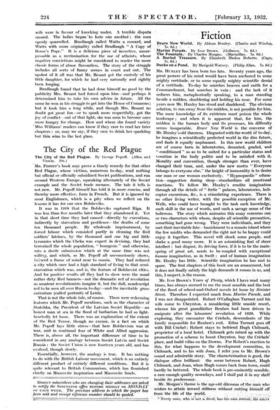The City of the Red Plague
Ma. POI.OFF'S book may prove a timely remedy for that other Red Plague, whose victims, numerous to-day, read nothing but official or officially subsidized Soviet publications, and run around Western Europe, squeaking alternately of the Soviet example and the Soviet trade menace. The tale it tells is not ,new. Mr. Popoff himself has told it in more concise, and thereby more effective, form in French. But it is ignored by most Englishmen, which is a pity when we reflect on the lessons it has for our own Bolsheviks.
It was in 1919 that the Bolsheviks captured Riga. It was less than five months later that they abandoned it. Yet in that short time they had caused—directly by executions, indirectly by starvation and pestilence—the deaths of some ten thousand people. By wholesale imprisonment, by forced labour which consisted partly in cleaning the Red soldiers' latrines, by the thousand and one big and little tyrannies which the Cheka was expert in devising, they had terrorized the whole population, " bourgeois " and otherwise, into a docile submission which at the same time was not willing, and which, as Mr. Popoff all unconsciously shows, induced a frame of mind near to mania. They had reduced a city which once had a high standard of living to that semi- starvation which was, and is, the feature of Bolshevist cities. And for positive results all they had to show were the usual rather dirty Red banners—not the dramatic red of revolution as amateur revolutionists imagine it, but the dull, nondescript red to be seen all over Russia to-day—and the inevitable gross caricature (called portrait) of Lenin.
That is not the whole tale, of course. There were redeeming features which Mr. Popoff mentions, such as the character of Stutchka, the President of the Latvian Soviet Republic—an honest man at sea in the flood of barbarism he had so light- heartedly let loose. There was an explanation of the extent of the Red Terror, though no excuse, in a fact on which Mr. Popoff lays little stress—that here Bolshevism was at war, and in continual fear of White and Allied aggression. There is, above all, the important difference of time to be considered in any analogy between Soviet Latvia and Soviet Russia : . the Soviet Union is now fourteen years old, and has evolved, though slowly.
Essentially, however, the analogy is true. It has nothing to do with the British Labour movement, which is an entirely 'different product of entirely different conditions. Rut it is quite relevant to British Communism, which has flourished chiefly on Muscovite inspiration and Muscovite funds.






































 Previous page
Previous page